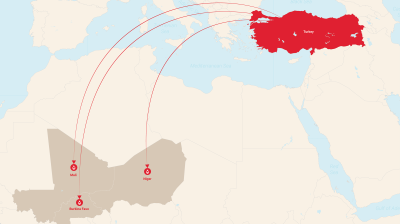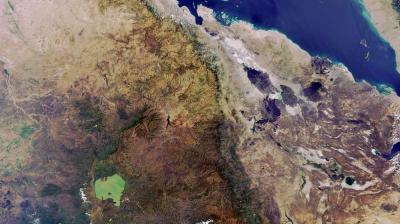The Twilight of French Influence in the Sahel
This article was previously published by ICDI, on 27 September 2023.
Only a little over a decade ago, Malians cheered on French forces after they responded to an official request for military assistance from Bamako and pushed back against jihadists and Tuareg separatists in the country’s north. As jihadist violence spread further in Mali and to neighbouring Burkina Faso and Niger in the following years, France cemented its role as the primary security partner of the Sahelian states it had once colonised.
Yet, only in a matter of the last three years, democratically elected governments aligned with Paris have been toppled in Mali, Burkina Faso and, as of this July, Niger by military juntas unsympathetic to French interests and security assistance. After a swift deterioration of diplomatic relations with Paris culminated in French forces being forced out of Mali and Burkina Faso last year, France’s military is now facing the same fate in Niger. This represents a major blow to French President Emmanuel Macron, who had doubled down on its security partnership with “stable” Niger following the coups in neighbouring states. Meanwhile, popular discontent against France has spread, as has disinformation targeting France’s presence in the region, and Russia has been gaining traction as a new security partner.
From invaluable security partner to persona non grata
How did France, in just over ten years, go from being regarded as an invaluable international security partner in the Sahel to being persona non grata? For Paris, the blame lies mainly with rising “anti-French sentiment,” and it has largely held Russia responsible for engineering it. Yet, its fall from grace is more complex, stemming from deep-rooted historical and security factors that have laid fertile soil for Russian disinformation to instrumentalize. In other words, while Russia is often seen as the arsonist when it comes to “anti-French sentiment” in the region, it would be more accurate to say that Moscow has fanned its flames.
France’s brutal colonial history in the Sahel provides an important lens through which to interpret growing discontent at the former colonial power’s military presence and policies in the region, now widely referred to as “anti-French sentiment.” Many in the Sahel have come to see Paris’s double standards toward democracy, its policy-meddling, and its security cooperation framework as postcolonial echoes of times past.
France’s Sahel policy perceived as a postcolonial remnant
Notably, France’s contrasting reactions to the successive coups in the region have fuelled accusations that it only pays lip service to democratization on the continent. On the one hand, Paris readily offered its support to Gen. Mahamat Idriss Deby after he seized power in Chad in 2021 following the death of his father, former President Idriss Deby. It also maintained close relations with Lt. Col. Paul-Henri Damiba’s military junta after it toppled Burkina Faso’s former President Roch Kaboré in early 2022. Both had elected to maintain a close security partnership with France. On the other hand, Paris swiftly condemned the 2020-21 coups in Mali, the October 2022 coup in Burkina Faso and the coup in Niger this July, all led by military juntas unsympathetic to French interests. For many in the region, this served as proof that France’s Sahel policy is based on double standards, with Paris publicly supporting democratic transitions while pursuing security policies based on realpolitik partnerships, including with autocratic regimes.
France has also come to be seen as meddling in its regional partners’ policies when it came to the conflict. Notably, while support grew in Mali, Burkina Faso and Niger for negotiating with jihadist groups, France firmly opposed it. Only in Niger was President Mohamed Bazoum able to officially announce his government had undertaken talks with jihadists, and so only after the balance of power with Paris shifted in his favour when France was forced to withdraw from Mali.
Paris has also been accused of striking a paternalistic tone and behaviour in its dealings with its regional partners, both in its political discourse and its approach to security cooperation, whereby it set up its own bases and ran some of its operations independently from local militaries. The lack of transparency surrounding some of its missions has also added fuel to the fire. For example, the findings of a UN investigation that alleged a 2021 French airstrike on a wedding party in Bounty had killed several Malian civilians remain contested by Paris.
France’s inability to stamp out jihadist groups and alleviate the spiralling violence in Mali, Burkina Faso, and Niger has also played an important role in turning it into a magnet for criticism. Its counter-terrorism mission Barkhane, which lacked clear parameters and strict objectives, dragged on for close to a decade with a narrow focus on security, while rising violence in the region was compounded by deep-rooted political and governance crises. In recent years, weary and frustrated local populations have stood in disbelief at French troops’ inability to restore peace, or at the very least to prevent further jihadist expansion. This growing vexation was compounded by the painful memory of France’s brutal colonial history in the region.
Russian disinformation fanned the flames of “anti-French sentiment”
These factors, among others, have contributed to laying fertile ground for Russia and new-age “pan-Africanists” to further demonize France through carefully crafted political communication and disinformation campaigns – which Paris has largely failed to counter effectively. The outcomes of these disinformation efforts have benefitted both Russian political and economic interests, and military putschists.
In recent years, Russia has leveraged its relays in regional political elites and civil society (e.g. the activists Kemi Seba, Nathalie Yamb and Adama Ben Diarra a.k.a. Ben le Cerveau), and coordinated disinformation campaigns on social media in a bid to destabilise governments aligned with Paris and uproot France and its international partners from the region. Through its relays, it has south to cast itself as a well-intentioned and capable security partner. Meanwhile, it has instrumentalized existing grievances to paint France as a self-interested and paternalistic post-colonial power offering second-rate security assistance, and governments allied with France as puppet regimes.
Russian disinformation has created both an incentive and an opportunity for coup plotters. In Mali, where many of these narratives first emerged, amplifying “anti-French sentiment” – and content targeted at ECOWAS, the United Nations mission MINUSMA, or other European partners – became a means for the May 2021 putschists to shore up support for their junta by rallying the population under the flag at a time when they faced international pressure and defeats on the battlefield. It was not long, for example, before unfounded accusations that Paris supplied jihadist groups with weapons spread on social media and were echoed by the newly empowered military junta in Mali.
A similar dynamic could be observed in Burkina Faso during the October 2022 coup. When the putsch faltered in its first few days, the new junta went on national TV to inaccurately accuse France of sheltering then transitional President Damiba and to hint at a future partnership with Russia. The televised announcement drew thousands of supporters to the streets, turning the tide in the coup stalemate and sealing the new junta’s victory.
France’s “new” security cooperation policy was too little too late
As tensions with its Sahelian partners worsened and Russian influence rose, Paris sought to make its increasingly controversial military presence less visible in a bid to salvage its crumbling influence. The first significant adjustment came last year on the heels of spiralling tensions with Mali. In the same breath, Macron announced the withdrawal of Barkhane and that France would henceforth focus on training local militaries while bolstering its support for more “stable” regional partners which, at the time, ironically included Niger. However, the announcement did not prevent yet another blow to France’s influence when, mere months later, Burkina Faso broke off its bilateral defence treaty with France and expelled its forces.
In a further bid to defuse tensions with remaining regional allies and to cut its losses at a time when Moscow and the paramilitary Wagner Group made further inroads in the region, Macron unveiled earlier this year his government’s new Africa Strategy. The new policy boasted what he said was a new “framework for security cooperation” that would see France shift from establishing its own bases to sharing them with local militaries and focus on capacity-building rather than running its own operations. In reality, the “new” framework largely repackaged the core tenets of his announcement from the previous year. Macron’s new Africa Strategy, he vowed, would also be rooted in “humility” and “respect.” Yet Macron’s declarations since have sent mixed signals. As recently as late August, Macron ventured to assert that if France had not intervened militarily in Mali, Burkina Faso and Niger, “these states would not exist today”, sparking further ire in the region.
With Niger’s new military junta now seemingly also breaking away from France’s influence, the tentative tweaks Paris has reluctantly implemented to its security cooperation framework appear to have been too little too late to address the wider set of factors that have contributed to eroding its influence in the Sahel. There is, conversely, little that France seems willing to do. It is no secret that France’s military involvement in the Sahel now lacks domestic support, and with all of Europe’s attention turned to Russia’s invasion of Ukraine, Macron made clear in his new Africa Strategy this year that he was unwilling to pursue a logic of competition with Moscow in the Sahel.
As France’s influence wanes, other players step onto the scene
France’s influence in the Sahel is on life support today. After Mali and Burkina Faso, Paris may well decide to pull the plug on its presence in Niger, despite its current refusal to fulfil the putschists’ request that it withdraws from the country. However, it is likely to attempt to keep alive a discreet presence in Chad and coastal states such as Benin and Cote d’Ivoire, where it still enjoys some support. It remains to be seen whether France has learnt the lessons from its Sahel debacle, and whether it can sustain and adapt these remaining partnerships without crystalising further tensions locally.
Meanwhile, as France is drawing down and the U.S. mulls over its next move, and as Russia attempts to elbow its way in, the Sahel is increasingly attracting keen interest from other international players, like Turkey and China, who may well once more upend the geopolitical landscape of the region.







